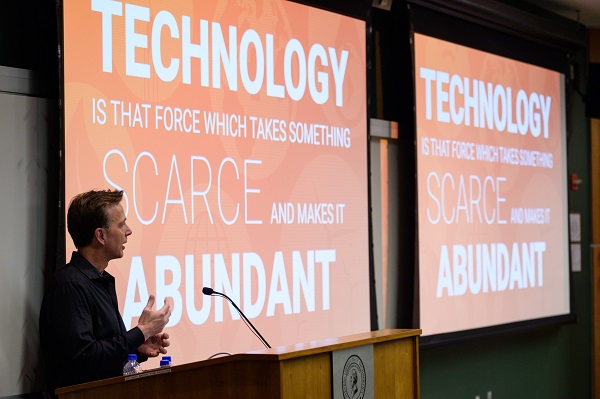Technology Progress is Making Science Fiction a Reality, Bill Barhydt Tells Crowd at Stevens
- Robots with human-like parkour athletic skills, running over rocky terrain.
- A smartphone with AI diagnosing diseases as well as, or better than, doctors.
- Computers as powerful as all the human brains on Earth combined, operating in a world where renewable energy — solar and wind power — dominates fossil fuel.
All this sounds like science fiction. But not to Bill Barhydt, who spends a lot of time gauging what the future will look like. Barhydt delivered the Thomas H. Scholl Lecture at Stevens Institute of Technology’s Innovation Expo, giving a talk titled, “Where WiFi Meets SciFi: Entrepreneurship in a Future Shaped by AI, Bitcoin and Flying Robots.”
“We are in a place now where technology is progressing so fast, it’s almost like every month something that used to be science fiction is becoming reality,” Barhydt said.
A Stevens alumnus from the class of ’90, Barhydt is a recognized technology expert and entrepreneur. He is the founder and CEO of Abra (Mountain View, Calif.), a digital and cryptocurrency trading and investing platform that enables users worldwide to transfer funds, invest in different classes of assets and hold cryptocurrencies through a Bitcoin-based app.
His resume includes the CIA, NASA, Goldman Sachs and Netscape.
According to Barhydt, the world has serious problems.
“Currencies around the world are failing, and it’s scary, and the government’s role when it comes to information privacy is equally scary,” he said.
“Half the global population doesn’t have access to traditional financial systems,” he told the Stevens audience.
“Businesses are expected to fill a widening leadership vacuum in society. In many cases, governments aren’t able to lead the way, so entrepreneurs have to.” Bill Barhydt,
Meanwhile, “there are 16- and 17-year-old entrepreneurs who develop apps on a smartphone, put them in an app store and have those apps downloaded by millions of people. The power of the individual and what they can do and their increasing access to information globally is unapparelled, and that power of the individual is actually increasing.
“Businesses are expected to fill a widening leadership vacuum in society. In many cases, governments aren’t able to lead the way, so entrepreneurs have to,” he said.
Entrepreneurs are just are starting to think about “doing well by doing good. Most governments and companies do not think this way.” That has allowed technology and technological change to have unforeseen impacts on society, he said.
“We have to acknowledge the negative implications on society. People have never been more anguished and alienated.” For instance, “we make these smart phones that everybody is staring into all day. They were meant to help make us more connected.” Barhydt also noted that the U.S. suicide rate has increased by 25 percent since 1999. “That is an unbelievably alarming statistic, and we are not alone.”
But it’s not all gloom and doom.
“There’s so much here to be optimistic about. This is the best that life as we know it has ever seen. If you look at the last 100-year education levels, the numbers of democracies that exist, the number of people living in extreme poverty at an all-time low, it’s truly an incredible time. But it is essential that we recognize that we have responsibilities as entrepreneurs and business executives to make sure everyone has access, and that we are doing the socially responsible thing every time we create.”
” It is essential that we recognize that we have responsibilities as entrepreneurs and business executives to make sure everyone has access, and that we are doing the socially responsible thing every time we create.” Bill Barhydt
What, specifically, is Barhydt optimistic and excited about?
- The price tag for space exploration is dropping. “We have companies like SpaceX, Blue Origin and Virgin Galactic doing what was only possible before by nation states. And with the ability to reuse more and more of these delivery vehicles, we can turn them over rapidly. We have seen dramatic change in the economics around space flight. Space is a service the same way we now have software as a service.”
- Robotics is evolving fast. While people love watching robots fail, between 2015 and 2018, Boston Dynamics made changes in one of its robots, enabling it to skillfully tackle varied terrain and now run with ease. A couple of months later, the robot advanced again, adding parkour skills to its abilities.
- Regarding renewable energy, specifically solar and wind power, he said, “Unsubsidized solar energy is now beating traditional fossil fuel-based energy in some parts of the world. And the trend is very clear. Renewables are going to win. Wind prices have plummeted, as well, and in some places are cheaper than solar. This is hugely important because after food and shelter, energy is a foundational need to enable people to expand the hours they can learn, plug into the internet, work from home. And contribute to society.”
Then there’s artificial intelligence (AI), machine learning and deep learning.
“For starters, AI can diagnose diseases as well as, or better than, doctors in some areas,” and “that will be on a smartphone in five years,” he said.
By 2030, we are going to have computers as powerful as a human brain for $1,000; and by 2045, we will have computers as powerful as all human brains combined, according to Barhydt. “Imagine if your laptop or phone had as much power as all of humanity combined.”
“We need AI simply because our brains’ architecture hasn’t had an upgrade in 50,000 years, and there is no way we can keep up with the changing world otherwise,” he said. “AI to me is very simple: AI is based on the goal of making a machine as smart or smarter than a human.
“Machine learning is teaching machines to make decisions in situations they haven’t seen before. To do this, that means feeding machines huge amounts of data and helping train it to find the right outcomes.
“Deep learning is a branch of machine learning where artificial neural networks and algorithms inspired by the way neurons work in our own brains find patterns in raw data. By combining multiple layers of artificial neurons, as the layers increase, so do the neural networks’ ability to find increasingly abstract concepts,” he said.
And, most importantly, those networks are learning on their own. Barhydt added, “Learning optimization skills that are entirely independent of humans and historical data is now possible, and no longer needs huge amounts of data.”
Meanwhile, for the first time, we have had internet-based money.
“The idea of government-printed money has not changed in hundreds of years. As a longtime cypherpunk, I think this holy grail of money has always been a trustless monetary protocol for the internet,” he said.
“How do we take the world that we know, which is based on dollars and euros, pesos and yen, Apple shares, QQQ, and spiders, and remake that world work using this trustless technology?
“At Abra, we have invented this idea of a synthetic asset that allows you to store a dollar, an Apple share, any liquid asset in the world on a smart phone for the first time, without having a trusted third party involved in storing that asset. So, you are physically carrying the dollar with you digitally by phone.”




